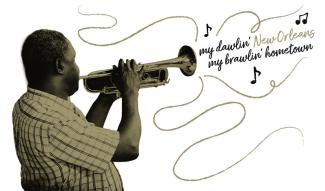Every other Friday on WWOZ-FM 90.7, Bill deTurk hosts his “Louisiana Music Party” from 11 a.m.–2 p.m. The show features traditional jazz, New Orleans and Louisiana musicians and new artists.
DeTurk, 61, a Bucknell University graduate, came to New Orleans for Jazz Fest ’94 and never left. The former bartender and professional emcee (Zydeco Fest and Tomato Fest) is also the author of “Big Easy Bartending Guide.” His wife, Aimee Landreneau, is a contract specialist in Capital Projects in Tulane University Campus Services, which oversees the school’s infrastructure.
DeTurk’s theme song is the late L’il Queenie’s “My Darlin’ New Orleans.” “It’s an appropriate song,” he said. “I knew L’il Queenie and loved her personality.” Some of the lyrics:
“My dawlin’ New Orleans/My brawlin’ Hometown/ Your magnolia melancholy/How it softly gets me down/In corner bars/On streetcars/Hear that foghorn river sound/The big oaks/The old folks/Beads of moss hanging down.” (The lyrics were created by Ron Cuccia and the Jazz Poetry Group.)
I asked deTurk why hundreds, maybe thousands of songs are written about New Orleans and Louisiana. He talked about the musicians coming here from Africa and Caribbean countries, how the French loved music and balls and brought Mardi Gras here. With Mardi Gras comes music. “You can’t have Mardi Gras without music,” he said.
“Then you have the Acadians and the slaves in Congo Square who played their music on Sundays. All these events and circumstances came together,” he said.
DeTurk is attuned to music. His dad played in the Big Band era with Billy Butterworth in the Midwest. He cautioned that this vast subject is “a dissertation, a PhD topic.”
DeTurk admits he’s not “a qualified ethnomusicologist,” “but I realized we have something here to celebrate that nobody else has.” Also, the late Ernie K-Doe, the self-named “Emperor of the Universe,” once famously said, “I’m not sure but I’m almost positive all music came from New Orleans.”
You could have a parlor game naming your favorite New Orleans and Louisiana songs. A few: “Isle of Orleans” (Tim Laughlin), “Louisiana 1927” (Randy Newman), “City of New Orleans” (Arlo Guthrie/Willie Nelson), “Ain’t No Place to Pee on Mardi Gras Day” (Benny Grunch), “Jambalaya” (Hank Williams Sr.), “Johnny B. Goode” (Chuck Berry), “Marie Laveau” (Bobby Bare/Chuck Berry), “House of the Rising Sun” (The Animals), “Born on the Bayou” (Creedence Clearwater Revival), “Walking to New Orleans” (Fats Domino), “Going Back to New Orleans” (Deacon John Moore), “Mardi Gras Mambo” (The Hawketts), ”Carnival Time” (Al Johnson), “Mardi Gras in New Orleans” (Tuba Fats), “Mr. Bojangles” (Jerry Jeff Walker), “When the Saints Go Marching In” (Louis Armstrong/George French), “At the Foot of Canal Street” (John Boutte), “It’s a New Orleans Thing” (Allen Toussaint).
In these songs New Orleans is pronounced both New Or-leenz and New Aw-linz.
“Louisiana Love Call” (Maria Muldaur), “Louisiana Man” (Doug Kershaw), “Go to the Mardi Gras” (Professor Longhair), “Good Morning New Orleans” (Kermit Ruffins), “Down in New Orleans” (Dr. John/Little Joe/Harmonica Smith), “You Never Can Tell” (Chuck Berry).
And, finally, the classic song sung by Louis Armstrong and others and one of the most popular songs after Hurricane Katrina, sung by Marva Wright, Wanda Rouzan, Topsy Chapman and Yolanda Windsay at Tulane Commencements since 1999, “Do You Know What It Means to Miss New Orleans?”
No doubt about it!































































